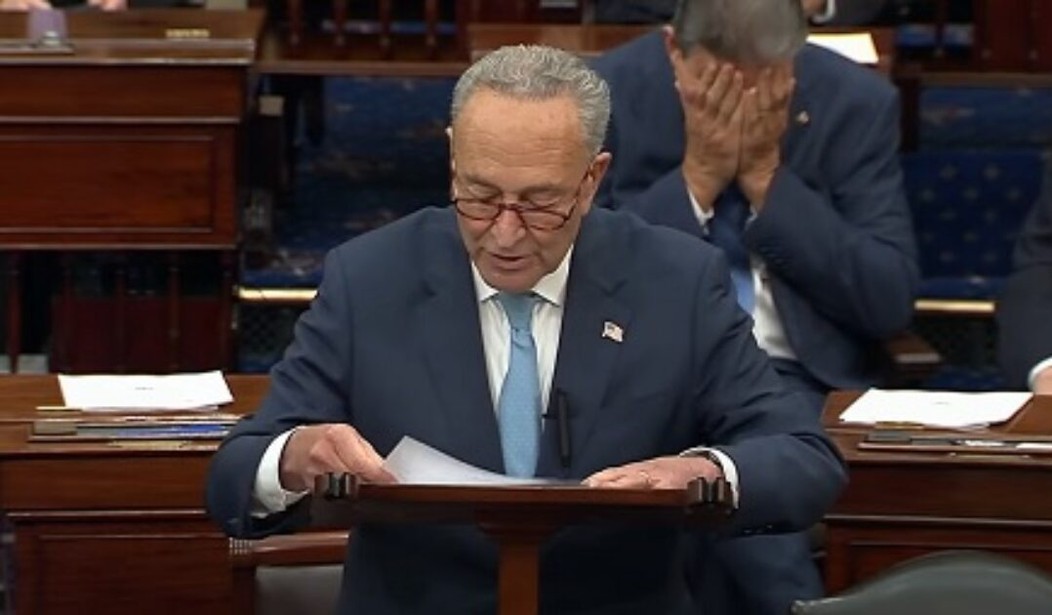Does it matter? The progressive agenda turned out to be a dead end for Joe Biden and Chuck Schumer, but that doesn’t necessarily mean they can execute a U-turn. The Hill notes that Schumer’s turning his attention to the moderates among Senate Democrats, but that’s no easy task:
Senate Democratic moderates are urging their leadership to tack to the center by moving bills to the floor that can pass with strong Republican support, but it’s creating tension with liberals who don’t want to abandon the core components of Build Back Better, voting rights legislation and other progressive priorities.
Senate Majority Leader Charles Schumer (D-N.Y.) appears to have heard the message from moderates in his caucus loud and clear.
This week, Schumer is stressing plans to vote on legislation that has bipartisan support, such as ending the use of forced arbitration clauses to avoid sexual harassment and assault lawsuits, a bill to strengthen the nation’s cybersecurity infrastructure and a measure to improve U.S. competitiveness with China. …
The shift away from partisan initiatives that occupied the Senate’s time and attention last month and the end of last year — filibuster reform, voting rights legislation and Build Back Better — comes after centrist Democrats made clear that they wanted to focus on more bipartisan legislation.
Alternate headline: “Chuck Schumer learns math.” Honestly, this lesson was obvious from the moment the Georgia special elections handed Senate control to Schumer solely on the vote of Kamala Harris. It shouldn’t have required embarrassing failures that extended for months on end to figure out that a 50/50 Senate would require a large measure of bipartisanship to get anything accomplished.
Schumer might have belatedly learned that lesson, but that and five bucks will get the Majority Leader a café latté. Schumer likely didn’t need to learn it in the first place; it was the progressive wing of Democrats in both chambers on Capitol Hill who had to figure out that they couldn’t force their radical agenda through the needle’s-eye-thin advantage they have in the House and Senate. The quibbling among Senate progressives over Michelle Childs strongly suggests that the lesson hasn’t sunk in yet with his caucus.
So too does the progressive purity campaign on which The Hill reported over the weekend:
Senate Majority Leader Charles Schumer (D-N.Y.) has a brewing civil war on his hands as Democratic activists turn up the volume on talk about challenging Sens. Kyrsten Sinema (Ariz.) and Joe Manchin (W.Va.) in future Democratic primaries.
More centrist members of Schumer’s caucus want to move past the messy internal battles over President Biden’s Build Back Better agenda and filibuster reform, two high-priority issues where Manchin and Sinema stood apart from the rest of the caucus.
But liberal lawmakers and many Democratic activists are still fuming over the failures to pass a sweeping climate and social spending bill or voting rights legislation – and the roles Manchin and Sinema played.
On that score, Schumer still seems to be siding with the progressives, too:
One Democratic senator, who requested anonymity to discuss the internal dynamics of the caucus, said that Schumer’s reluctance to say he would support either Manchin or Sinema in a future primary “shows how disgruntled he is” with his centrist colleagues.
The senator said Schumer also doesn’t want to divide Democrats in his home state ahead of his own reelection campaign this year. A second Democratic senator also speculated that Schumer’s decision is driven by a desire to avoid a fight with progressive activists.
With all that on Schumer’s plate, how much effort will he put into passing a centrist agenda that excludes progressives’ priorities? Probably only enough to claim that he’s making an effort, and no more. No one’s learning any lessons from the spectacular, embarrassing, and entirely predictable failures of the Democrats over the past year. Except, of course, midterm voters.








Join the conversation as a VIP Member